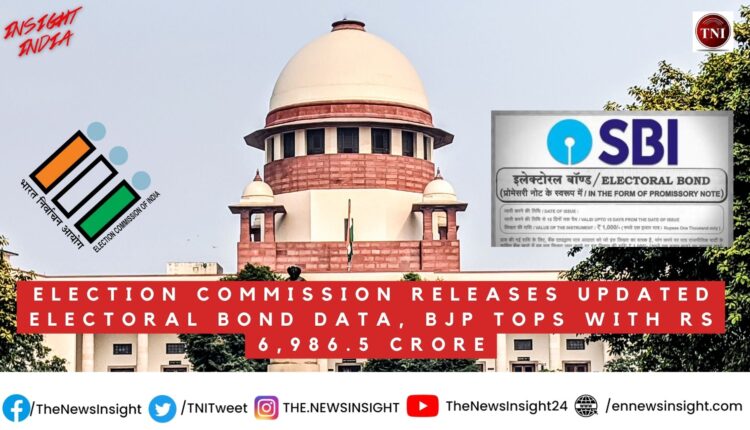New Delhi (TNI Bureau): The Election Commission recently disclosed updated information regarding funds received by political parties through the electoral bonds scheme, which has since been discontinued. This information, initially submitted to the Supreme Court in sealed covers and later uploaded onto the Election Commission’s website, includes details such as issuance dates, denominations, number of bonds, issuing SBI branches, as well as dates of receipt and credit into the parties’ bank accounts.
However, crucially, the data did not include the electoral bond numbers, which are instrumental in linking donors to recipients. Despite this, some parties voluntarily listed their donors in the data submitted to the Election Commission.
According to the revealed data, the BJP emerged as the largest beneficiary, receiving funds totaling Rs 6,986.5 crore through electoral bonds. Trinamool Congress followed with Rs 1,397 crore, Congress with Rs 1,334 crore, and Bharat Rashtra Samithi with Rs 1,322 crore. Other significant recipients included BJD from Odisha, DMK, and YSR Congress from Andhra Pradesh.
Further scrutiny of the data revealed that JD(S) received bonds worth Rs 89.75 crore, including a substantial amount from Megha Engineering, the second-largest purchaser of electoral bonds. It was also disclosed that Future Gaming and Hotel Services Pvt Ltd, led by Santiago Martin, was the most significant purchaser of electoral bonds, totaling Rs 1,368 crore.
Of note, DMK received a substantial portion of its funds from Future Gaming, accounting for approximately 37 per cent of the company’s total donations.
The Election Commission’s release of this new information followed its approach to the Supreme Court to modify its previous order, particularly regarding the disclosure of electoral bond numbers. During the court proceedings, SBI faced criticism for not fully complying with the court’s previous directives.
Prior to this disclosure, the Election Commission had already published data shared by SBI on its website, detailing the purchase and encashment of electoral bonds by companies and individuals within certain denominations since April 12, 2019. However, this data did not specify the amounts received by each party from individual donors.
Support Independent Journalism? Keep us live.
This revelation coincides with the announcement of dates for the upcoming Lok Sabha elections, scheduled to be conducted in seven phases from April 19 to June 1, with results expected on June 4.
BJD Receives High Amounts During the Pandemic; Encashes Electoral Bonds Totaling Rs 775.5 Crore
According to data released by the Election Commission, the Biju Janata Dal (BJD), ruling in Odisha, received substantial funds amounting to Rs 775.5 crore through encashed electoral bonds.
The data shows a pattern of bond encashment by the BJD over the years. In 2019, shortly after the party regained power in the state, it encashed bonds worth Rs 10 crore in July, followed by another Rs 10 crore in January 2020, and a larger sum of Rs 67 crore in October 2020.
During the height of the COVID-19 pandemic’s second wave, the BJD reportedly cashed in bonds totaling Rs 116 crore in April 2021, and later Rs 125 crore in October 2021. In the subsequent year of 2022, the party encashed bonds totaling Rs 195 crore.
As the BJD prepares for the upcoming elections, seeking a sixth consecutive term in power, it is notable that the party encashed bonds amounting to Rs 252 crore between February and November 2023.
In the broader context, the BJD emerged as one of the top recipients of electoral bond funds, receiving a total donation worth Rs 944.5 crore, as per the recently released electoral bonds data. This places them ahead of the DMK, which received Rs 656.5 crore in donations.


Comments are closed.